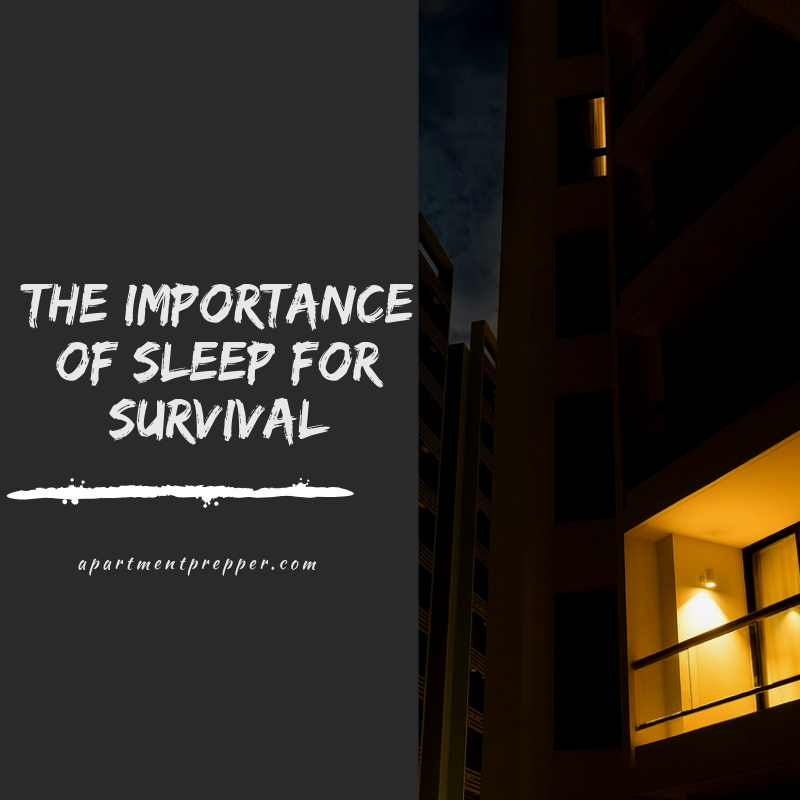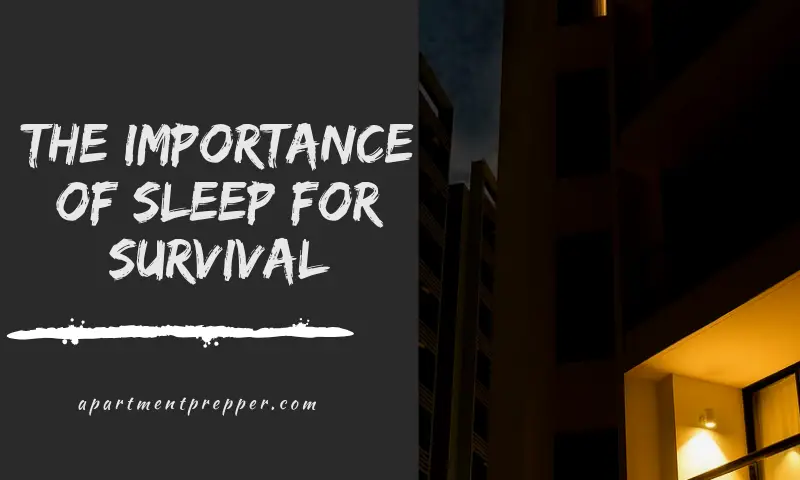Editor’s note: Today we are discussing an aspect of survival that we have not covered before: sleep. Even though sleep is not immediately associated with survival and preparedness, it is actually critical you get a good night’s sleep to be able to function properly. The high stress involved in an emergency or disaster can rob you of sleep and cause more health problems and misery. The following article has some great tips that can help you get a good night’s sleep. I’d love it if you can help support Apartment Prepper on Patreon to help keep this site free. But it’s all up to you, I’ll still post articles as normal whether you do or not 🙂
The Importance of Sleep for Survival
Written by Dan Vale
Do you get seven or eight hours of good quality sleep every night? If not, this article will give you sleep remedies to improve your life.
Good quality sleep will help you to achieve good health. Being in good health when a disaster occurs will increase your chances of surviving that disaster.
Some of the consequences of poor sleep can include:
1. being more likely to catch colds, the flu, and other infections
2. being more prone to having emotional problems, including depression and anxiety
3. Being more irritable and more likely to experience mood swings
4. forgetting critical information
5. being less able to deal successfully with stress
6. being more prone to poor judgment, inadequate concentration, and bad decisions
Those who have not learned to sleep well during normal times will be even less likely to sleep well during disasters. During a power blackout, for example, a lack of air conditioning in the summer or a lack of heating in the winter can make sleeping difficult. Also, the disruption of regular living patterns can result in anxiety that can disrupt sleep. In addition, the stimulus deprivation of sheltering in place, of reduced lighting, and of no electronic entertainment such as television can further increase anxiety and degrade sleep.
Preppers who know about and practice good sleep hygiene will be healthier during normal times and more able to deal with disasters such as extended power blackouts, blizzards, floods, heat waves, hurricanes, tornadoes, and wildfires. How we spend one third of our lives is important and worthy of improvement.
Here are ways you can improve your sleep:
1. make your bed and bedroom more peaceful and uncluttered
2. have at least one hour of direct sunlight exposure every day
3. stay well hydrated during the day, but drink no more water when within an hour of bedtime
4. allow for at least three hours for food digestion before bed time.
5. exercise every day, but not less than two hours before bedtime
6. develop a bedtime routine
7. go to sleep and get up at the same times every day
8. dim your lighting for an hour before going to bed
9. wind down to bedtime with relaxing activities
10. move slowly as you approach bedtime, and tell yourself how sleepy you feel
11. keep your feet warm at night
12. keep the bedroom dark at night, or wear an eye mask
13. think of only pleasant thoughts while falling asleep
There also are products that can help to promote sleep, including, for example:
1. white noise machines that have relaxing sounds such as the ocean surf, rain, and summer night sounds
2. sleep masks to block out light
3. aromatherapy
4. relaxing music
Examples of habits that can keep you from sleeping better include late night activities such as:
1. TV viewing
2. web surfing
3. overexposure to other bright lights
4. phone calls
5. binge drinking
6. binge eating
During those nights when sleep will not come, preppers should not toss and turn in bed. This will only make their bed become associated with anxiety. Instead of becoming anxious about their inability to get to sleep, preppers should, after about a half an hour of sleeplessness, get out of bed. Then, they might sit for a while in a comfortable chair such as a rocker or an easy chair and think of positive memories or thoughts. Instead of sitting in a chair, they might want to do other relaxing activities such as gentle stretching. Eventually, they should feel sleepy and ready to return to bed.
How well and how long do you sleep? What methods do you use to get enough good quality sleep?
About the Author:
Dan Vale has a Bachelor Degree in Physical Education. He won the Mr. Delaware Bodybuilding Contest in 1968 and earned his karate Black Belt in 1973. He has had a lifelong interest in physical fitness. Furthermore, for over seven years, he wrote 785 of articles for the Examiner Online Newspaper. Most of these articles were written in his capacity as the Baltimore Prepper Examiner. To see his Amazon books, visit his Amazon author page.
Image by Arek Socha from Pixabay




Good tips Dan, sometimes my sleep patterns get thrown off from just everyday stress.
I tried having a “night cap” but alcohol is not the answer.
So I sit in my chair until I start dosing off and that seems to work.
Southern Nationalist, Thanks for sharing alcohol is really not the answer. Appreciate the comment!
As a 3rd shift worker I know just how much not getting enough sleep or quality sleep effects me. Plus the changing of my sleep patterns when I am trying go have time off.
And add to your list – traffic accidents from being sleep deprived
Hi Oldguy, That is so true, sleep deprivation does contribute to traffic accidents. Thanks for the addition!
You folks have made some good comments. After a stressful day I find that I really need to wind down several hours before going to bed. I have had evening and night work shifts before, and I was so happy to get changed to earlier work shifts.